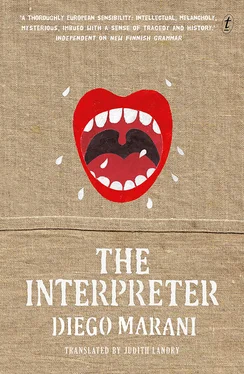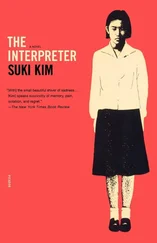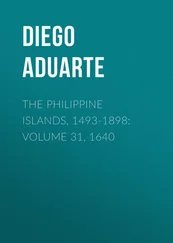I took refuge on a landing-stage from which I had a view of the esplanade in front of the conference centre; I sat down in the cold on a mooring post, still breathing deeply in my attempt to ward off the attack. I had fallen over several times during my flight, tearing my trousers and grazing one of my hands on the gravel. I paused there for a moment, with the snow and the fine sand blowing into my eyes. Hugging my coat around me in an effort to keep warm, I kept an eye on the tinted windows beyond the black creek, and when I saw the first figures coming down the steps and onto the esplanade, where a row of taxis was waiting for them, I stood up wearily, walked back towards a corner of the conference centre and positioned myself behind the hull of an upturned boat that had been pulled clear of the waterline; from where I stood I could distinguish the faces of the people who were emerging from the building. What I was seeking among the crowd who were shaking each other’s hands and talking into their mobile phones, eyes on the middle distance, was Stauber’s ruddy face, his short steps and awkward gait; but the esplanade was emptying out, and there was no sign of anyone who looked like him. The last taxis were driving off, as were the last minibuses with the insignia of the various grand hotels; lights were going off in the foyer. I approached the building cautiously. Hugging the wall, I went back up the steps and slipped inside, pushing at the first door I came upon. I heard voices from inside the hall, some clattering and clanking, the echo of empty rooms. I hid between the pots of ornamental plants. A workman was pushing a trolley across the foyer, laden with assorted equipment; porters were shuttling to and fro, carrying piles of folders and files; behind his desk, the Asiatic-looking usher was putting the earphones back into their cases. Quaking with apprehension, I slipped past the screen previously manned by the two guards and went up the stairs to the interpreters’ booths; clinging to the balustrade, dragging my aching leg, I proceeded to the corridor, lit now only by a few dim security lights. Above the window to each booth was a sheet of paper with the name of the language the interpreter had been translating from; I walked along the corridor until I came to the door to the German booth, noting that it was very slightly ajar. I stopped, took a deep breath and listened hard, but all I could hear was the hum of a distant vacuum cleaner. In the auditorium behind me workmen were folding up the velvet curtains and loading them onto a trolley. I approached the door with extreme caution, doing my best to avoid making the boards creak. I leaned against the wall and turned the handle, pushing against it with my shoulder, but it held firm; I peered in through the spy-hole, but could see nothing. I tried the door again with all my force, and this time it gave way; I stumbled in and fell upon something soft. In such faint light as penetrated through the tinted glass I recognised Stauber, lying on his back beside me; two fingers of one hand were caught in the lead of the microphone he still had twisted around his neck; his other hand was clutching the leg of a chair. Empty and rheumy, his half-closed eyes wore a surprised expression. Floundering wildly, I edged away from the body, drew myself up to a sitting position and leaned against the wall, panting heavily. The floor was scattered with papers, pencils and tattered dictionaries, clear evidence of a recent struggle. As I attempted to get to my feet, I noticed a sheet of paper protruding from Stauber’s jacket pocket; I pulled it out and held it up to the light. The list! The interpreter’s list, yet again, but this time printed on art paper, with no crossings-out. Beside the city of Tallinn, an unsteady hand had added four strange names: Kim, Kaina, Leda and Ferdinand, this latter underlined. Scarcely had I recovered from this barrage of unexpected events than I heard the sound of steps in the corridor. Someone was coming, and they were coming fast; I glimpsed their shadow on the glass of the next-door booth. I heard the swish of fabric and the quick, laboured breathing of someone who has been running, then smelled the bitter smell of untreated wood mingling with the pungent scent of heated resin; it filled my nostrils, entered my brain, triggering off a rush of sights and memories. It was him, the interpreter, right there, outside the door! He had killed Stauber and now he was coming to kill me! I thrust the sheet of paper into my pocket, jumped over the upturned chair and pulled the door open, shifting the corpse as I did so in order to get out. But the man I found before me was the Asiatic-looking usher, who jumped back in fright on seeing me and flattened himself against the wall. As soon as he recognised me, though, he seemed to recover himself, but when he saw Stauber’s corpse he grabbed me by the lapels and let out a shriek. I tried to struggle clear, but the man had strong fingers, and all that I managed to do was to pull myself round with my back against the wall and push my aggressor towards the door of the booth. I could already hear the thump of the guards’ boots on the stairs. I let myself fall heavily to the ground, taking the usher with me, then thrust him in the direction of the half-open door of the booth, where he encountered Stauber’s lifeless arm. That caused him to loosen his grip; he crawled through the door into the booth, colliding with the chair, which then lodged itself in the door. I beat a hasty retreat, continuing down the corridor, to find, to my relief, that there was also a staircase at the other end; once down it, I hid myself among the ornamental plants which the workmen had assembled in front of the large windows, then rolled across the floor as quietly as I could until I found myself by one of the main doors. Looking up, I saw the two guards peering anxiously over the balustrade, seeking me out among the hopeless jumble of curtains, plants and crates scattered throughout the foyer. I waited until they had gone down the corridor to rescue the usher, then pushed open the main door and slipped out. There was one single taxi left on the esplanade; the driver had left the engine running to keep warm and was leafing through a newspaper, the air thick with smoke. I leapt aboard and shouted to him to drive as fast as he could to the timber wharf, number thirteen.
The man with the rubber boots was speaking Romanian; he looked at his watch and assured me that we would be in Warsaw by dawn. He was smoking and spitting into the snow, covering the traces carefully with his boots. The others nodded in agreement; their hands thrust deep in their pockets, they were prancing around in front of a bonfire which had been lit on the only remaining patch of concrete in a sea of ice-hardened mud. From behind mounds of earth, lorries were emerging, zigzagging over the steep terrain, their lights revealing a landscape of brushwood and scrap metal strewn around the remains of an old public weighbridge. It was Janos who had sent me to this godforsaken place, promising me that he would see to getting me a passport and taking mine in exchange; he had told me to ask for Radu, a Moldavian who helped illegal emigrants to cross the border and who would have me out of Ukraine within a few hours. A thickset, beefy man, he was greeted with universal deference when he jumped down from the first lorry without even waiting for it to stop, and a crowd gathered around him in a circle; he was wearing a fur cap with loose ear-flaps which hung to either side of his face like two deformed protrusions. The men then handed him bundles of banknotes which he counted rapidly before stuffing them in his pocket. Seeing me standing to one side, he gestured to me to come forward: ‘Warsaw!’ I said firmly; the circle opened up to let him pass. Radu positioned himself firmly before me, legs apart, and held out a bare hand with an expectant air.
Читать дальше












